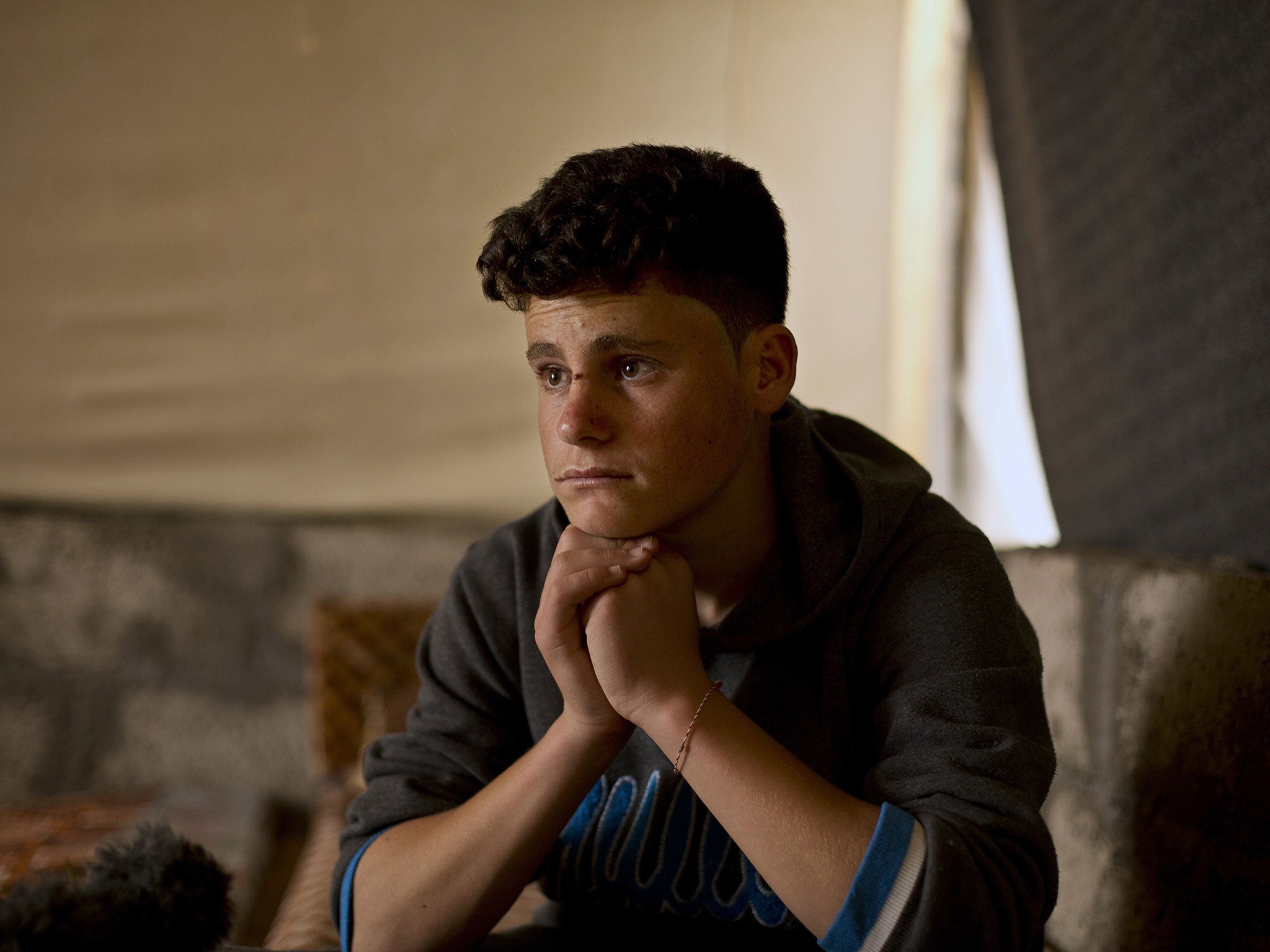Isis starved Yazidi children and told them they could eat in paradise if they carried out suicide bombings
'They were telling us, "You are not Yazidis anymore. You are one of us"'

They made the captive children, weak from hunger, fight over a single tomato. Then the Isis militants told them that in paradise they could eat to their hearts delight, but they could only get there by blowing themselves up.
The lesson was part of the indoctrination inflicted by the militants on boys from Iraq's Yazidi religious minority after the extremist group overran the community's towns and villages in northern Iraq. The group forced hundreds of boys, some as young as 7 or 8, into training to become fighters and suicide bombers, infusing them with its murderous ideology.
Now boys who escaped captivity are living in camps for the displaced along with what is left of their families.
"Even here I'm still very afraid," said 17-year-old Ahmed Ameen Koro, who spoke to The Associated Press in the sprawling Esyan Camp in northern Iraq, where he now lives with his mother, sister and a brother, the only surviving members of his family. "I can't sleep properly because I see them in my dreams."
The militants stormed into the Yazidi heartland in the summer of 2014, killing tens of thousands of people and kidnapping thousands of women and girls to be used as sex slaves. The Yazidi minority's ancient faith is considered heretical by the Islamic extremists.
US-backed Kurdish forces drove Isis out of Sinjar in November 2015, but few Yazidis have returned, and an estimated 3,500 remain in Isis captivity in Iraq and Syria, according to Human Rights Watch.
Ahmed's family tried to flee when the militants descended on their village, but Isis fighters captured him, his 13-year-old brother Amin and four cousins.
The boys were taken to the Isis-held town of Tal Afar, some 30 miles (50km) away, where they were kept in a boys' school along with dozens of other boys and teens. The adult men were taken away, leaving the women and girls.
"They chose and took the girls they liked," Ahmed recalled. "I remember the girls were crying, as well as the mothers. They were dragging these girls from the arms of their mothers."
"They were all very big bearded men, they looked like monsters," he said.
Ahmed was among some 200 Yazidi boys sent to a two-month training camp in Tal Afar. They studied the Quran and the militants' hard-line interpretation of Islam, and learned to shoot assault rifles and pistols. They watched videos on how to use a suicide belt, throw a grenade, or behead a person.
"They were telling us, 'You are not Yazidis anymore. You are one of us,"' Ahmed said.
Akram Rasho Khalaf was only 7 when his town was overrun by the militants. His family tried to flee, but the militants opened fire and Akram suffered shrapnel and bullet wounds to his abdomen and hand. He was taken by ambulance to Mosul, seized earlier that summer by Isis, where he underwent surgery. He never heard from his parents again.
Akram fidgeted as he talked about his captivity, saying he remembered being too hungry to be afraid.
Eventually, he was brought to Raqqa, Syria, the Isis group's self-declared capital. There the militants would throw balls at the children's heads. If anyone cried, he was beaten. Those who didn't cry were praised, and told they would one day be suicide bombers.
"They were saying they are our friends, but the kids were scared to death," Akram said in Kabarto Camp, where he now lives with his uncle, two siblings and other relatives.
"They were telling us, 'When you grow up, you will blow yourself up, God willing,"' he said.
Training included sliding on their bellies through barricades of burning tyres, jumping over obstacles and off roofs. Akram wasn't strong enough to handle a gun, so he was forced to be a servant.
Two years after Akram was taken captive, his uncle received a photo of his nephew dressed in black Islamic garb and an offer to smuggle him out of Raqqa for $10,500 — an increasingly common practice.
The family borrowed the money from a relative in Germany, and eventually the boy was smuggled out. He was reunited with what remains of his family on 29 November — two years and three months after he was seized.
Ahmed escaped sooner. On 4 May, 2015, nine months after their capture, Ahmed and his brother Amin sneaked away from the training camp in Tal Afar, hid in a mosque until nightfall, then fled with a small group of others on foot.
"We were very thirsty because we ran out of water," he said. "We were almost dying."
But fear kept them going, and after a nine-day, 55-mile (90km) trek they reached the Sinjar mountains, where Kurdish peshmerga forces rescued them.
Akram's uncle says his nephew suffers nightmares, anxiety, sleeplessness and bedwetting. The boy's 8-year-old brother and 5-year-old sister, rescued separately after ransom was paid, have similar problems.
"Sometimes they become very aggressive and they beat up other children or our children," he said.
Carl Gaede, an American clinical social worker and executive director of Tutapona, a US-based nonprofit specialising in war trauma, says these reactions are common among survivors.
"We've seen a number of the children acting out in violent ways and family members needing to hide the knives, hide dangerous items out of fear of how the children might use them," said Gaede, who works with survivors of Isis brutality.
Ahmed sees a counsellor, like many living in the camp, and fills his days now with school and running a small shop.
Asked about his dreams for the future, Ahmed answers immediately. "When I grow up I will take my revenge against Daesh, against those infidels."
AP
Join our commenting forum
Join thought-provoking conversations, follow other Independent readers and see their replies
Comments